-
Home
- ISO 27040 Certification
All Categories
- ISO 9001:2015
- IAF Register
- Organic certification
- ISO 14001:2015
- OHSAS 18001:2007
- ISO 27001:2013
- ISO 13485:2016
- ISO 50001-2011
- CE Marking
- ISO 15000 HACCP
- ISO 29990:2010
- ISO 22301-2012
- Lead Auditor Training
- ISO 29993:2017 Certification
- Other Services
- HSE MS
Quick Links
- About us
- CE Marking Certification
- Impartiality Statement
- Founder
- Quality Policy
- ISO Application Process
- Certified Client
- Accredited Certificate Need to be Converted
- History
Quick Links
- About us
- CE Marking Certification
- Impartiality Statement
- Founder
- Quality Policy
- ISO Application Process
- Certified Client
- Accredited Certificate Need to be Converted
- History
- CE Notified Body
- ISO 10002
- ISO 50001
- Low Voltage CE
- Responsible Care Management System
- IFS Food
- Global GAP
- Code of Integrity
- Use of Marks
- Key Elements of BCMS
- IAF Register of Accredited Certificate
- What are Key Documents required for Client as per ISO?
- IAF Register
Read More
ISO 27040 Certification
ISO 27040 Certification for Storage Security
ISO/IEC 27040:2015 provides comprehensive guidelines for implementing and managing storage security within organizations. As data continues to grow exponentially, the need to protect storage environments from unauthorized access, data breaches, and other security threats becomes paramount. This standard is designed to assist organizations in safeguarding their storage infrastructures, whether they involve physical devices, virtual environments, or cloud-based solutions. By implementing ISO 27040:2015, organizations can ensure the confidentiality, integrity, and availability of their stored information. The standard is particularly beneficial for industries that handle sensitive or regulated data, such as financial services, healthcare, and government agencies. With the proliferation of hybrid storage systems combining on-premises and cloud-based solutions, ISO 27040:2015 offers a versatile framework to manage storage-related risks effectively, adapting to the complexities of modern IT environments. This standard not only addresses the technical aspects of storage security but also emphasizes the importance of organizational policies, training, and continuous monitoring to maintain a secure storage ecosystem. By adopting ISO 27040:2015, organizations can protect their critical assets, enhance resilience against potential threats, and build a foundation of trust with stakeholders.
Structure of the ISO 27040 Standard
ISO 27040:2015 is organized into key clauses that address various aspects of storage security. These clauses provide a systematic approach to understanding and implementing security measures across diverse storage environments:
Clause 1: Scope - Defines the applicability of the standard and its focus on securing storage environments, including storage networks and media. This clause sets the boundaries for implementation, ensuring clarity for organizations.
Clause 2: Normative References - Lists supporting standards and documents essential for implementing storage security. These references provide additional guidance and context for aligning with best practices.
Clause 3:Terms and Definitions - Provides terminology and definitions relevant to storage security to ensure clarity and consistency. By standardizing the language, this clause helps reduce ambiguity in security planning and implementation.
Clause 4: Overview of Storage Security - Explains the fundamentals of storage security, including threats, vulnerabilities, and the need for protective measures. This clause serves as an introduction to understanding the critical importance of secure storage environments.
Clause 5: Storage Security Framework - Describes the framework for implementing security controls, including access management, encryption, and audit mechanisms. It highlights the importance of integrating security into the design and operation of storage systems.
Clause 6: Security Requirements for Storage Systems - Details the specific security requirements for different types of storage systems, such as SANs, NAS, and cloud storage. This clause addresses unique challenges associated with each storage architecture.
Clause 7: Security Controls for Storage - Provides guidelines for implementing controls, such as data encryption, key management, and access control. It also emphasizes the use of advanced techniques, such as multi-factor authentication and role-based access.
Clause 8: Storage Security Management - Focuses on managing storage security through policies, risk assessments, and monitoring processes. This clause underscores the importance of regular audits and updates to maintain a robust security posture.
Benefits of ISO 27040 Certification
1. Enhanced Data Protection: Ensures robust security measures are in place to protect stored information from unauthorized access and breaches. For example, a healthcare provider can secure patient records using encryption and access controls, reducing the risk of medical data leaks and ensuring compliance with privacy regulations.
2. Regulatory Compliance: Helps organizations meet legal and regulatory requirements related to data storage security. For instance, financial institutions can align with GDPR or PCI DSS standards by adopting ISO 27040:2015, demonstrating their commitment to safeguarding sensitive customer data.
3. Improved Risk Management: Provides a framework for identifying and mitigating risks associated with storage environments. For example, businesses can reduce the likelihood of data loss by implementing backup and recovery solutions, enhancing their ability to recover from cyberattacks or natural disasters.
4. Operational Efficiency: Streamlines storage security processes, reducing the complexity of managing diverse storage environments. For instance, IT teams can implement centralized monitoring and management for SAN and NAS systems, enabling quicker detection and resolution of security issues.
5. Enhanced Customer Trust: Demonstrates a commitment to securing sensitive data, fostering trust among clients and partners. For example, a cloud storage provider can attract more customers by showcasing ISO 27040:2015 certification, offering assurance that their data will be handled securely.
6. Adaptability to Evolving Threats: By following the guidelines in ISO 27040:2015, organizations can stay ahead of emerging security threats. For instance, a retail business can protect its growing e-commerce data by regularly updating encryption protocols and monitoring access patterns.
Who Should Establish the Requirement for ISO 27040 Certification
Organizations across various industries that manage sensitive or regulated data should consider ISO 27040:2015 certification. These include:
1. Financial Institutions: To secure transaction records, customer information, and regulatory compliance data, ensuring trust in their operations.
2. Healthcare Providers: To protect patient records and meet legal requirements, such as HIPAA, while preventing potential breaches that could compromise patient privacy.
3. Government Agencies: To safeguard classified and sensitive information from unauthorized access, ensuring national and organizational security.
4. Cloud Storage Providers: To enhance trust and attract customers by demonstrating secure storage practices, differentiating themselves in a competitive market.
5. IT and Data Centers: To ensure the security of stored information across diverse systems, including SANs, NAS, and virtualized environments, fostering operational resilience.
What Are the Documents and Records an Organization Should Maintain for ISO 27040 Certification
Mandatory Documents
1. Scope of the Storage Security Management System (Clause 4.3)
2. Storage Security Policy (Clause 5)
3. Storage Risk Assessment and Treatment Procedures (Clause 6.1)
4. Access Control Policies for Storage Systems (Clause 7)
5. Encryption and Key Management Guidelines (Clause 7.2)
6. Monitoring and Audit Procedures for Storage Security (Clause 8.1)
Mandatory Records
1. Records of Risk Assessments for Storage Systems (Clause 6.1)
2. Logs of Access to Storage Systems (Clause 7.1)
3. Records of Encryption and Key Management Activities (Clause 7.2)
4. Incident Logs Related to Storage Security (Clause 8.2)
5. Internal Audit Reports on Storage Security (Clause 8.3)
6. Training Records for Employees Handling Storage Systems (Clause 8.4)
Non-Mandatory Documents (Examples)
1. Guidelines for Secure Data Backup and Recovery (Clause 7.3)
2. Templates for Storage Security Risk Assessments (Clause 6.1)
3. Procedures for Responding to Storage Security Incidents (Clause 8.2)
4. Checklists for Reviewing Storage Security Controls (Clause 7.4)
5. Training Materials on Storage Security Best Practices (Clause 8.4)
This structured approach enables organizations to secure their storage environments effectively, align with international best practices, and foster trust and resilience in managing sensitive data. By adhering to ISO 27040:2015, organizations not only protect their critical information but also strengthen their competitive edge in a data-driven economy.
Process for ISO 27040:2015 Certification
The certification process for ISO/IEC 27040:2015 involves a series of well-defined steps to ensure compliance with the standard’s requirements for storage security management.
1. Stage One Audit: A preliminary audit to assess the organization’s readiness for certification. This includes a review of storage security policies, procedures, and initial implementations related to data storage protection.
2. Stage Two Audit: A detailed on-site audit conducted by the certification body to evaluate the implementation and effectiveness of storage security controls. Auditors verify compliance with ISO 27040:2015 by reviewing storage systems, data protection mechanisms, and risk management processes.
3. Addressing Non-Conformities: Organizations must address any non-conformities identified during the audit. This involves implementing corrective actions and submitting evidence of compliance to the certification body.
4. Certification Decision: Upon successful resolution of non-conformities, the certification body issues the ISO 27040:2015 certification, demonstrating the organization’s commitment to securing its storage systems.
5. Surveillance Audits: Regular audits are conducted to ensure continued compliance and improvement of storage security practices.
6. Recertification Audit: Performed every three years, the recertification audit evaluates the sustained effectiveness of storage security controls and ensures continued conformity with ISO 27040:2015 requirements.
How to Apply for ISO 27040 Certification
To apply for ISO 27040:2015 certification online, organizations can submit their inquiry through TNV Certification Pvt. Ltd.’s website or send an email. TNV offers a streamlined application process to help organizations enhance their storage security practices. A detailed application form is available, allowing companies to provide essential information about their storage systems, security measures, and areas of focus. TNV ensures comprehensive support throughout the certification journey, from the initial application to the successful issuance of the ISO 27040:2015 certificate.
Contact Us To begin your ISO 27040:2015 certification journey, contact TNV Certification Pvt. Ltd. for tailored support:
• Download Application Form: Visit our website to access form F-01.
• Submit Inquiry: Use the Contact Us section on our portal or email info@isoindia.org for detailed assistance.
TNV Certification Pvt. Ltd. offers a wide range of ISO certifications, helping organizations achieve compliance, build trust, and enhance operational efficiency. Take the first step toward secure and compliant storage security today.
Integration of ISO 27040 with Other Standards
ISO 27040:2015, a standard focusing on storage security, can be integrated with other management system standards to create a unified framework for organizational management. For instance, integrating ISO 27040 with ISO 27001 (Information Security Management System) enhances security by aligning storage-specific controls with general information security practices, ensuring a robust overall security posture. Integration with ISO 27701 (Privacy Information Management System) supports organizations in managing storage-related privacy obligations, reducing risks of data breaches and regulatory non-compliance. Similarly, integrating ISO 27040 with ISO 22301 (Business Continuity Management System) ensures that storage security is maintained during disruptions, safeguarding business resilience.
By combining ISO 27040 with other standards, organizations can streamline processes, minimize redundancies, and achieve comprehensive management objectives that support security, efficiency, and compliance.
Other Standards for Integration:
• ISO 55001:2014 (AMMS): Asset Management System
Integration of these standards provides a holistic approach to managing security, quality, and compliance, enabling organizations to meet diverse stakeholder expectations and achieve their strategic objectives effectively.
- ISO 27001:2022
- ISO 20000-1:2018
- ISO 21001:2018
- ISO 14001:2015
- ISO 45001:2018
- ISO 22000:2018
- ISO 50001:2018
- ISO 27701:2019
- ISO 55001:2014
- ISO 41001:2018
- ISO 37001:2016
- ISO 13485:2016
- ISO/IEC 42001:2023
- ISO 20121:2024
- ISO 37301:2021
- ISO 27017:2015
- ISO 9001-2015
- ISO 27035 Certification
- ISO 27032 Certification
- ISO 27018 Certification
- ISO 27040 Certification
- ISO 27050 Certification
- ISO 29100 Certification
Certificate
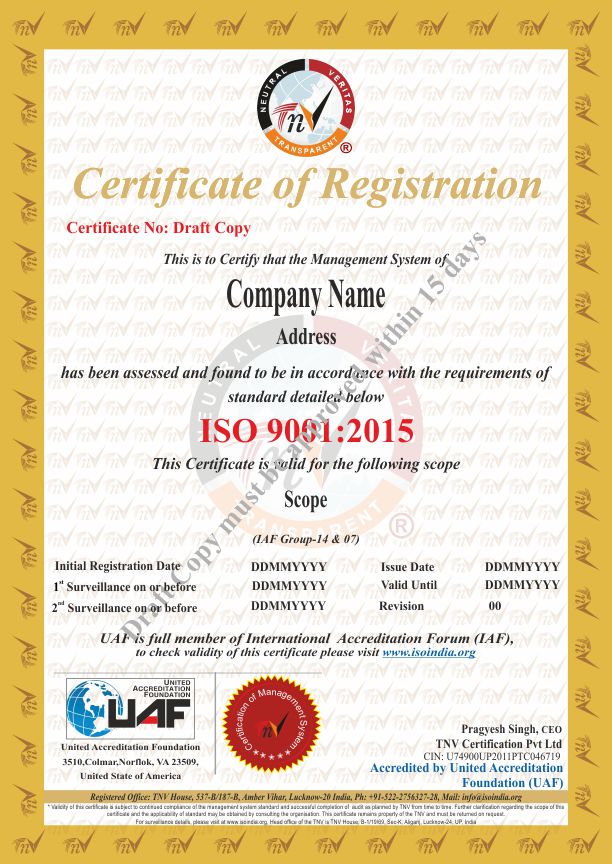
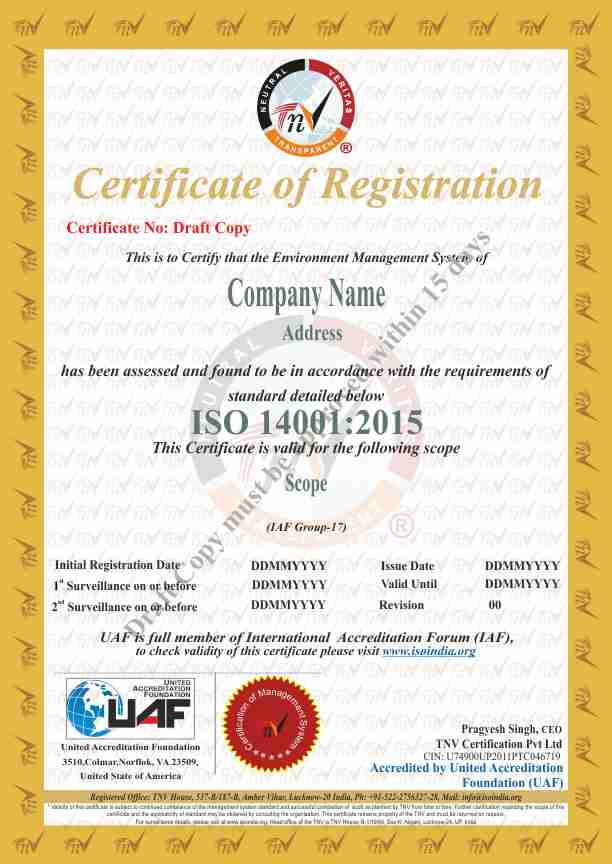
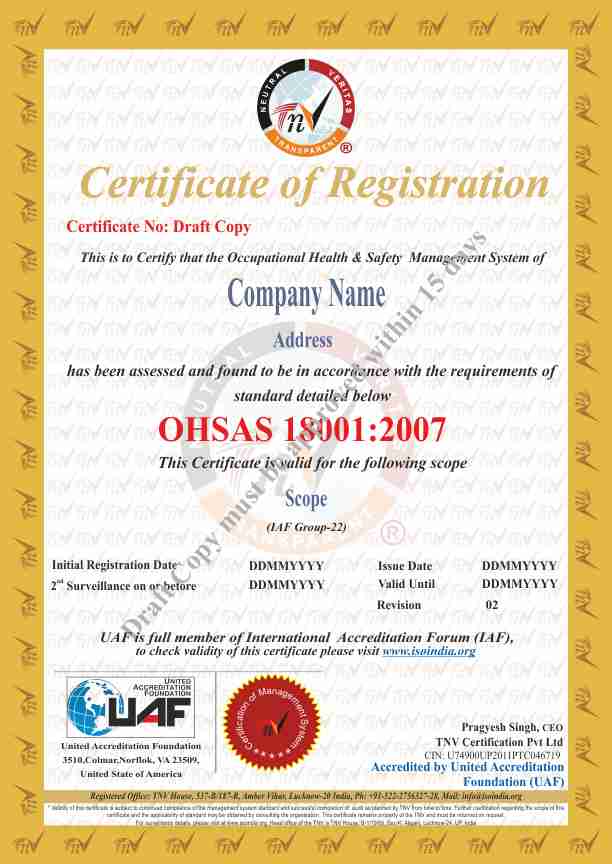
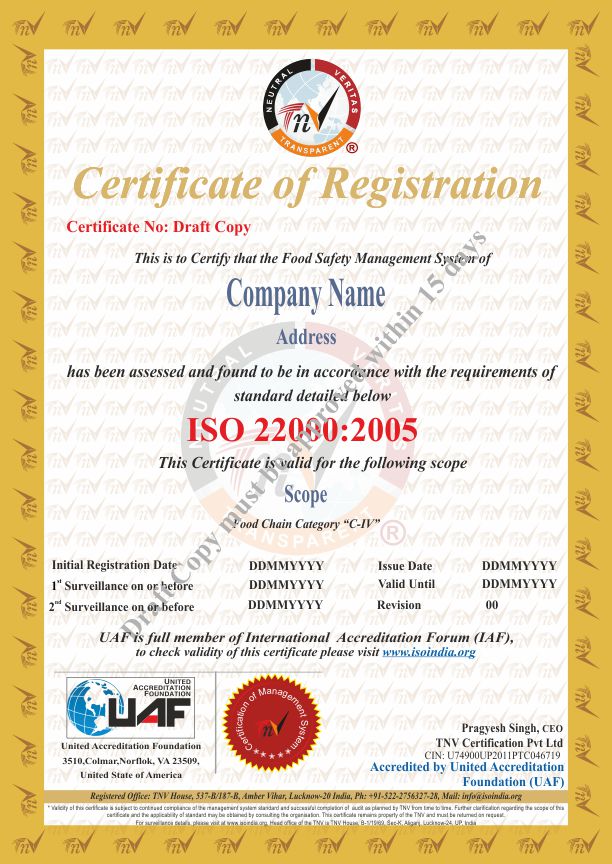
.jpg)
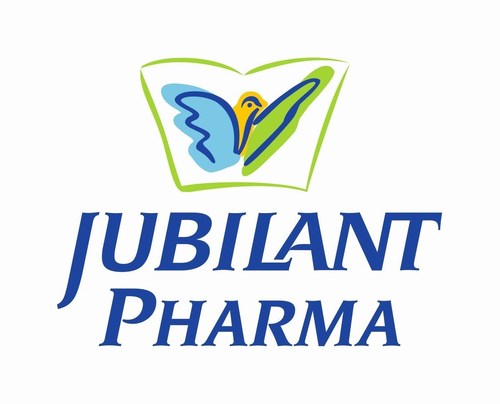 Sanjeev Sharma
Sanjeev Sharma
We are Certified by TNV since last 6 years and we are absolutely happy and satisfied with the systematic approach of the Team. Best Wishes.
»
 PT. Sun Health Care
PT. Sun Health Care
As always it was an excellent input that we got from TNV, looking forward to continuing a relationship with them. The assessment was very much a structured approach. Our team learned a lot Ari Rahmawati Director of PT Sun Health Care (El John Medica) »
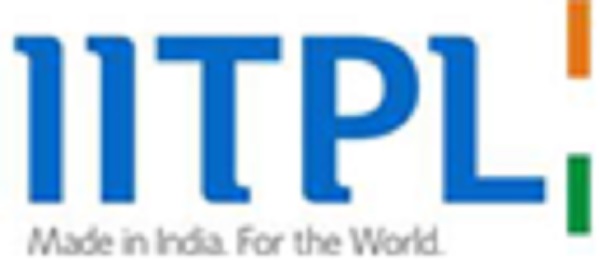 Innovation Imaging Technologies Pvt. Ltd
Innovation Imaging Technologies Pvt. Ltd
"May I take this opportunity to thank you for all your help in the arrangements and organisation for the Training of MD QMS Lead Auditor Certification Course attended. The course was very informative and structured to our requirements. I feel that the relationship that has been b »
 SSP Tech Consultancy Malaysia
SSP Tech Consultancy Malaysia
SSP Tech Consultancy Malaysia is so proud on the long lasting relationship with TNV Certification PVT LTD.
We have been working with TNV since 2010 and there were more than 80 clients have been certified in the field of ISO9001 , ISO14001, ISO45001 & ISO 13485.
We thank you For »
 Maria P. Belyanchikova
Maria P. Belyanchikova
Dear Sir,
We kindly express gratitude for your
outstanding service and long-lasting
cooperation.
Since 2014 our companies in Russia, Moscow,
and United Arad Emirates, Dubai, have several
times ordered certification, surveillance and
audit from TNV Certification Pvt LTD and »
 Unnikrishnan Narayanan Namboodiri
Unnikrishnan Narayanan Namboodiri
Dear Sir,
It is with great pleasure that we at Inspirit Safety Solutions Pvt Ltd, are conveying our gratitude and appreciation to TNV Certification Pvt Ltd for providing the best of services in the domain of
Management System trainings and certifications by accepting us as an a »

I have developed a great relationship with TNV Certification Pvt LTD.
I have undergone a few trainings with TNV training team & have
found their approach to be a highly professional & committed to
providing quality trainings & certifications. I am glad that I also have
had th »







